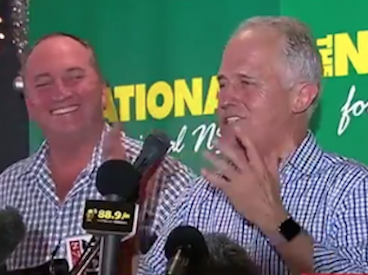It seems unlikely that Ministers Hunt, Tudge and Sukkar – lawyers all – will be held to account for their blatant contempt for the rule of law, writes Ingrid Matthews.
THE FEDERAL GOVERNMENT is in a spot of legal bother.
This may seem like the old cliché about the builder with the unfinished home renovation. But, for tradies, the explanation is obvious — work for paying customers is prioritised because it puts food on the table.
The same explanation is not available to a government awash with lawyers, because its elected representatives are generously remunerated by the Australian public.
What is their excuse? Do they care? The news this week answers a few questions that regularly kick around my conversational circles.
Questions like:
- Who or what will hold this government to account?
- Federal corruption commission?
- Is it getting worse?
- How to tell?
Here is one answer: a Supreme Court moved to speak on judicial independence, public confidence in the administration of justice and the "rule of law". Here is another. When a policy has cost over $9 billion in three years (2013 to 2016) for outcomes so catastrophic, we just negotiated a $90 million settlement to 1,905 people subject to the policy — yes, something is rotten in the state.
Nobody is on trial
The first matter is a mention in Commonwealth Director of Public Prosecutions v Besim and CDPP v MHK. These are sentencing appeals before the Victorian Supreme Court. The defendants had pleaded guilty to planning to commit a crime. This act of planning has itself been made a crime, on the basis of the type of crime the person is planning to commit. Thus, neither man has committed an act of terrorism but both have terror-related convictions. Besim was sentenced to a maximum of ten years and a minimum of seven years, six months. MHK, whose identity is suppressed, was sentenced to seven years with a minimum of five.
The court reserved its decision as to whether these sentences are too lenient. Before any decision was brought down, three Federal ministers from Victoria – law graduates all – made comments to The Australian newspaper on the topic of judges, sentencing and terrorism. The comments have been retracted with regret, but no apology.
Ministers partially retract criticism of Victorian judiciary over terrorism cases @SBSNews https://t.co/qlQuweoueL
— Sacha Payne (@sachapaynesbs) June 16, 2017
Health Minister Greg Hunt said:
"Comments by senior members of the Victorian courts endorsing and embracing shorter sentences for terrorism offences are deeply concerning ... the state courts should not be places for ideological experiments in the face of global and local threats from Islamic extremism."
Assistant Treasurer Michael Sukkar said:
"It’s the attitude of judges like these which has eroded any trust that remained in our legal system. Labor’s continued appointment of hard-left activist judges has come back to bite Victorians. Our judiciary should focus more on victims and the safety of our society, and less on the rights of terrorists ... "
Human Service Minister Alan Tudge, who supports generating debt notices by algorithm – a practice known to drive welfare recipients to suicide – said:
"Some of these judges are divorced from reality. We have a crisis on our hands with people who want to kill indiscriminately and yet some judges seem more concerned about the terrorists than the safety of the community."
The Supreme Court wrote to the Attorney-General and called on the ministers to "show cause". The ministers were not "hauled" before the court. In fact, the ministers were not required to – and did not – face the court. Commonwealth Solicitor General Dr Stephen Donaghue QC appeared on their behalf.
The court took appearances and reserved its decision as to whether to refer the ministers for contempt. It is normally the Director of Public Prosecutions who decides to lay charges. In this case, the referral would be to the prothonotary of the Supreme Court and the prosecution would be for contempt of court.
Implications at law
This means exactly what it says. It is not complex. The legal implication is that the ministers showed contempt of court by improperly discussing, in the public domain, matters which were before the court.
Chief Justice Warren said in her opening remarks:
" ... the legal notions of contempt do not exist to protect judges or their personal reputations. These laws exist to protect the independence of the judiciary [from the political arms of government] in making decisions that bind governments and citizens alike."
Judicial independence is from the political arm of government. This is the doctrine of "separation of powers". Political interference in the judicial process is a breach of the doctrine and may undermine public confidence in the administration of justice. The key mechanism for dealing with this kind of breach is contempt. Judicial decisions bind government and citizens alike: ministers are not above the law because nobody is above the law. This is rule of law.
While the political leadership has skidded over this issue with glib remarks about free speech and public debate, I strongly suspect the public takes fundamental democratic and legal principle as seriously as does the judiciary and the rest of the legal profession.
The $90 million asylum seeker case did not go to trial either. It was what lawyers call an offer "on the courthouse steps".
As a lawyer highly experienced in these matters, Josh Bornstein writes that the Commonwealth follows:
'... a predictable pattern … strongly defending them for years, driving up legal costs, and then settling just before trial. The cases do not proceed to trial because torturing refugees is unlawful and the politicians are desperate that the shroud of secrecy over the conditions in detention is not lifted.'
Some of our politicians show a callous disregard of the separation of powers as it provides checks on abuse of power https://t.co/sPUnB3ORZD
— Kailani Mana (@mana_kailani) June 16, 2017
Most lawyers use words very carefully.
The evidence of torture is in a United Nations report, which found that Australia by holding asylum seekers in dangerous and violent conditions,
' ... violated the right of the asylum seekers, including children, to be free from torture or cruel, inhuman or degrading treatment, as provided by articles 1 and 16 of the Convention Against Torture.'
But it was not torture that inspired the emotions of the Minister for Immigration and Border Protection Peter Dutton. An apoplectic Dutton denigrated the law firm as "ambulance chasers" and furiously blamed the Labor Party for a settlement negotiated by his own administration. And the settlement is infuriating. Think how many asylum seekers could be assessed and resettled for that money.
All the ambulances lead to your concentration camps, Gruppenfuhrer PotatoHead https://t.co/RRsMkpdAkY via @smh #auspol #refugeeswelcome
— Ming The Merciless (@MGliksmanMDPhD) June 14, 2017
The reason offered was that $90 million is lower than the potential total costs if the case went to trial. Because the Commonwealth does not concede any liability, it logically follows that this "cost-saving" claim does not include compensation. In this hypothetical comparison, the Commonwealth spends in excess of $90 million to "win" the case and the court does not make a costs order against the "losers".
Back in the real world, there are possible alternative reasons. Maybe the Commonwealth did not have a robust defence or did not want the evidence presented in an open court. Perhaps the Commonwealth received legal advice pointing to a large compensation payment and massive costs order against it. In this scenario, the final figure – compensation plus costs – could well be higher than $90 million. But it turns on a finding of liability against the Commonwealth and the Commonwealth admits no liability.
These two positions – put by a Minister of the Crown in Parliament and negotiated by lawyers for the Commonwealth – cannot both be true. But both are legal. This, too, is rule of law. Meanwhile, the Australian public pays the settlement and the Australian public pays the salaries of Peter Dutton and Malcolm Turnbull. These men will not be held to account.
Accountability in democracy
In a class action like this, the onus is on the plaintiffs (asylum seekers) to show that harm was caused to them by the respondent (the Commonwealth). This is a microcosm of basic rules of logic. A classic example is the god debate. If I say that god exists, the onus is on me to show, using logic and evidence, that god exists. The onus is not on others to disprove a claim that I made without any evidence.
The principle derives from Athenian political philosophy, which penalised citizens who made speculative claims in the public domain. The idea is to disallow unsubstantiated nonsense, by holding citizens (free men, about ten per cent of the population) accountable for their public claims — literally, statements.
All citizens had the right and the obligation to participate in the governance of the city-state. This conceptualisation of obligations as rights has largely been lost in contemporary nation states. We know at some level that the flipside to rights is responsibilities. But responsibility is regarded as somewhat onerous. This departure from the spirit of the demos comes via the class-based "representative democracy" (House of Commons, House of Lords) and social contract constructed by the English.
In this model, we discharge our duty to participate by voting for a representative — and cede the right to participate in law-making to those representatives. This disaggregation of obligation-rights divides citizens from parliamentarians. But a trace of Athenian logic – the formal English word for truth and logical validity is "sound" – remains in the Westminster principle of ministerial accountability.
The idea is that ultimate responsibility for executive government decisions and actions lie with the minister. There is a mechanism for upholding this principle too. It is called resignation. A sound man – should his department do things so monumentally terrible as to be condemned by the Committee Against Torture, or should his legal representatives offer a $90 million settlement rather than have those terrible things revealed in an open court, should he act in breach of so fundamental a doctrine as separation of powers, or show contempt for the rule of law itself – and all while a minister of the Crown – a sound man holds himself accountable to the people, and resigns.
Ingrid Matthews is a sessional academic at Western Sydney University School of Law. You can follow Ingrid on Twitter @iMusing or her blog oecomuse.
DO IT: Greg Hunt, Alan Tudge and Michael Sukkar should be sacked or resign over attacks on Victorian judiciary https://t.co/3F0XL2u5A5
— Brett Boxcutter (@bbox) June 14, 2017

This work is licensed under a Creative Commons Attribution-NonCommercial-NoDerivs 3.0 Australia License
Turnbull's 'best practice'? UN slams Nauru as inhuman https://t.co/lz4IMFEtd3 @IndependentAus
— Michelle Pini (@vmp9) October 9, 2016
Monthly Donation
Single Donation
Support the rule of law. Subscribe to IA today.











